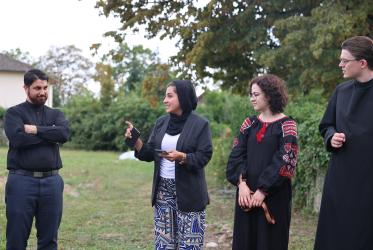"The best thought is one that always leaves a certain crevice for the possibility that everything is totally different at the same time." — Václav Havel
Rev. Martina Viktorie Kopecka, moderator of the World Council of Churches ECHOS Commission, cites this as her favorite quote from Václav Havel, opponent to Czechoslovak’s communist regime and later president of his country.
In a video contribution to an exhibit on Havel that opened on 10 October, Kopecka reflected on what this quote means to her: “the space for finding truth, life in truth, reflection of one's own behaviour, and respect for the freedom of others and our own freedom.”
The exhibition, entitled “The Power of the powerless,” opened in the Sala de la Lupa in the Chamber of Deputies building, where the Italian Republic was proclaimed in 1946. The exhibition reinterprets the essay "The power of the powerless” by Havel. It is co-organised by the Fondazione Costruiamo il Futuro and the Vaclav Havel Library in Prague.
Dianet de la Caridad Martínez Valdés, ECHOS commissioner from Cuba, offered her reflections on the essay as part of the exhibit. She highlights the resistance of Cuban people against the external powers, and the suffering that it implies. Then, Valdés alerts against the "siren songs" of the powerful that make us live in a society of lies with a false sense of freedom.
She warns about the risk of following a single narrative considered as “the Truth” and imposed by the strong countries. She concludes: “Yes, it is urgent that youth assume an active and prophetic role, denouncing injustices and announcing the hopes of the Gospel that allows for alternatives, for imagining beyond what is said is possible, for systems built on neighbourliness, abundance, and justice achieved through solidarity.”.
Pavel Fischer, president of the Foreign Affairs Committee of the Czech Republic, concluded the launch by sharing his experience working in Havel’s office. His words echoed other reflections: “The transition of Václav Havel’s message to the new generation is done.”
The exhibition will stay in the parliament until the 21 October. It will come to the Ecumenical Center in Geneva in 2020.




